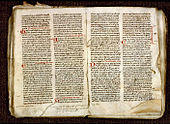Codicology (from Latin codex, genitive codicis, "notebook, book"; and Greek -λογία, -logia) is the study of codices or manuscript books written on parchment (or paper) as physical objects. It is often referred to as 'the archaeology of the book', concerning itself with the materials (parchment, sometimes referred to as membrane or vellum, paper, pigments, inks and so on), and techniques used to make books, including their binding.
There are no clear-cut definitions: some codicologists say that their field encompasses palaeography, the study of handwriting, while some palaeographers say that their field encompasses codicology. The study of written features such as marginalia, glosses, ownership inscriptions, etc. falls in both camps, as does the study of the physical aspects of decoration, which otherwise belongs to art history.
By a close examination of the physical attributes of a book, it is sometimes possible to establish the history and provenance of a book, or to match up long-separated elements originally from the same book. Palaeographers and codicologists may also study the history of libraries, manuscript-collecting, and book-cataloguing.
Important collections
There exist some very good online databases with research functions for medieval manuscripts.
- Codices Electronici Ecclesiae Coloniensis, Universität Köln, about 500 manuscripts (mostly German speaking area, with photos).
- 'Marburger Repertorium of German manuscripts in the 13th and 14th century, Philipps-Universität Marburg (descriptive catalog) (not included are solitary documents and minimal inscriptions in Latin Manuscripts).
- The Digital Walters, The Walters Art Museum in Baltimore, Maryland. Over 900 illuminated manuscripts and 1250 incunables.
- Codices Electronici Sangallenses have registered manuscript of St. Gallen.
- Department for Special Collections, University Library of Graz, Online-Catalogue with over 2.000 registered manuscripts partially already (2011) with detailed paleografic descriptions and digitally complete versions.
- Catalogue for Austria with illuminated manuscripts of the 8th to 13th centuries.
- British Library, several huge collections, e.g. Harlean Collection (also via Catalogue of medieval and Renaissance manuscripts). The known Anglo-Saxon works like Beowulf or Lindisfarne Gospel (Book of Lindisfarne).
- Bodleian Library, Oxford, catalogue, collections similar to the British Library, easy to use. Works all in good quality online.
- Library of Congress, Washington D.C., huge catalogue of manuscript collections.
- Hill Museum & Manuscript Library in Collegeville, Minnesota, 90,000 manuscripts from Austria and Spain.
- 'Ktiv' - The International Collection of Digitized Hebrew Manuscripts, A catalog of about 400,000 Hebrew manuscripts, of which about 100,000 are digitized.
See also
- Manusciptology
- Palaeography
- Fragmentology (manuscripts)
- Textual scholarship
External links
